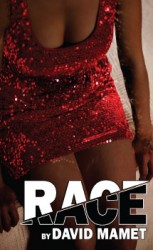
David Mamet’s Race is a short story with a long message. Next Act Theater is the perfect location to see a show of this nature, as you yourself feel like the jury to which the lawyers in the show constantly refer. The intimate space makes for a very personal theatergoing experience, and this story would not have been nearly as compelling if the audience was not so intimately involved.
In Race, a wealthy white man asks a multi-racial team of lawyers to take his case when he is accused of raping an African American woman. His story takes a back seat when tension arises between the Caucasian attorney and his African American legal aid when she finds out he illegally conducted a background search prior to hiring her. The show dances between racism and sexism, with undertones of classism and several stabs at the human condition.
David Cecsarini as Jack Lawson and Lee Palmer as Henry Brown embody two very different but equally vicious lawyers. Cecsarini is delightfully uncensored with all the smarminess and intelligence you could want in your defense attorney, while Palmer was more subtle with his wit and imposing with his conduct. Tiffany Renee Johnson plays the legal aid Susan, who is always uncomfortably lurking in the scene. Initially audiences are lead to believe she’s the teacher’s pet trying to learn all she can from her employers. However, as the story continues, we learn she is doing something entirely different, but just as self-serving. Johnathan Smoots as Charles Strickland, the alleged rapist and confirmed disconnected affluent, eventually earns the audiences’ pity after realizing his behavior hurt those he “cared about” (if the audience chooses to believe this). While this was a turning point in the show, it never fully cleared that character of his “dirty old man” status.
The actors had a few opening night jitters, but everyone was quick and accommodating with missed lines and false starts. Certain moments in the show felt a bit forced and uncomfortable, but the heavy subject matter made it easier to move past these moments. The play is also very face paced, with no intermission and the occasional transition aided by a soundtrack to move time forward.
The scenery was on point, with enough to be visually interesting but not more than necessary to keep the audience focused on the action. This story could be told in a paper bag and be just as impactful. However, the stage business was a bit unnatural and lacking, possibly to put the emphasis on the lines themselves. It was clearly tailored to the setup of the theater space and not to the action of two angry lawyers and their cohorts.
The play itself expresses what the characters spend ninety minutes learning – certain situations are more or less appropriate for discussing race and choosing them wisely makes all the difference. However, at the end of the show, the audience is still unsure who to root for and who to vilify, which I found more appealing than a solid resolution.
David Mamet’s Race is playing at Next Act Theater thought February 23, 2014. Tickets are $25 for the Wednesday matinee, $35 on Saturdays, and $30 for all other performances. Tickets are available online or by calling 414-278-0765.
